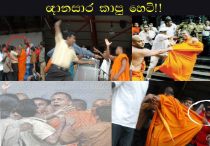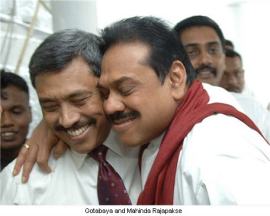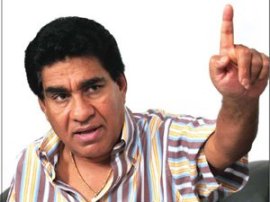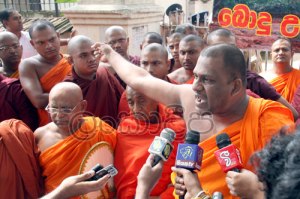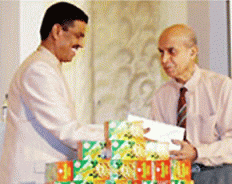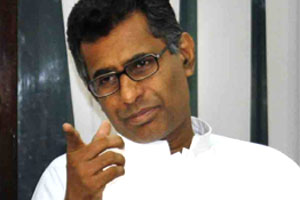 There is much concern among members of the Muslim community in Sri Lanka over the increasing number of unprovoked attacks on Muslim women wearing the “Abaya”, the robe like overgarment that covers the whole body.
There is much concern among members of the Muslim community in Sri Lanka over the increasing number of unprovoked attacks on Muslim women wearing the “Abaya”, the robe like overgarment that covers the whole body.
The issue is being viewed with concern at discussions of the Muslim community in different places in Sri Lanka and also features prominently in exchanges of views conducted via various media organs.
It is learnt that this issue was delved into at a recent meeting between some Muslim members of Parliament and representatives of the All Ceylon Jamiyathul Ulama(ACJU)that was convened by Cabinet minister of Urban Affairs AHM Fowzie to examine the full implications of the “Halal”certification Issue.
ABAYA
What is troubling the community most is the phenomenon of rising incidents concerning Muslim women in the Country wearing the Abaya.
Among the forms of feminine clothing of Muslims are the scarf covering the head known as “Hijab” , the veil covering the face known as “Niqab” and the loose robe like overgarment covering the whole body known as “Abaya”in Arabic, “Burqa” in Urdu and “Purdah” in Persian.
The names of these clothing are often confused or used interchangeably by many including the “Ethno Religious Fascist”Bodhu Bala Sena(BBS) organization which has been targeting the manner in which many Muslim women dress as part of its overall Anti-Muslim campaign.
A familiar feature of public speeches by BBS leaders including its President Ven. Kirama Vimalajothy Thera and General Secretary Ven.Galaboda Attha Gnanasara Thera had been the virulent view expressed against the Abaya or Burqa dress worn by Muslim women. All sorts of vulgar remarks and derisive comments were made against women wearing such clothing.
GONIBILLA
Both Vimalajothy and Gnasara Theros flouted principles of Vinaya by viciously attacking the Muslim women wearing such dresses. One description repeated frequently on BBS platforms was “Goni Billa” (scary person in a sack) Since the Abaya covered the whole body of the women, the BBS speakers called it “Goni Billa” in a manner that appealed to low tastes of people.
These derogatory speeches have already begun to impact on some misguided Sinhala youths. There have been scattered incidents where Muslim women in Abaya and even Hijaab clothing have been the target of caustic,offensive remarks.Attempts have been made to yank the clothing by street urchins in a few places.More serious incidents too have begun to proliferate in recent times
MANAMPITIYA
The latest incident is one that occurred in Manampitiya in the Polonnaruwa district concerning the Muslim postmistress who had assumed duties from February this year.On Saturday March 16th as she was leaving after work at the Post Office some youths accosted her and requested her not to wear the “Hijab”.She simply ignored them.
On Monday March 18th morning the Postmistress was on her way to the Post Office on Manampitiya Main street when youths on two motor cycles tried to snatch the Hijab away. The postmistress however held on to the scarf tightly. The youths had sped away as people started rushing to the scene.
The Muslim postmistress has lodged a complaint with the Manampitiya Police. She has stated that she was unable to see the faces of the would be Hijab snatchers as they were wearing helmets with visors.
FORT STATION
Another incident happened at the Fort Railway station on Friday March 15th.Four young Muslim girls all of them law students were walking on the railway platform when a bunch of young hooligans jeered and surrounded them.They began tugging and pulling at the Abayas they were all dressed in.
Mercifully others at the scene saw what was happening and came to the rescue.A gathering crowd began to berate the hooligans who beat a hasty retreat. It is noteworthy that those who chased the hooligans away were mostly Non –Muslims.
DICKWELLA
In an incident which happened a few weeks ago in Matara district three Muslim schoolgirls from Dickwella were attacked near the Mahanama bridge near Matara town. The girls all of them dressed in “Abaya”were returning around noon from AAT classes at Nupe,Matara.
A well built sturdy man with a hefty pole confronted them and began scolding them as “Gonibillas”. He then tried to hit one girl on the head with the stick but she had jumped to a side and escaped with the stick grazing her slightly. He had then tried to clutch the Abaya of another girl and hit her. She too evaded him sustaining a slight injury on her hand.The third girl ran away before the man could reach her.
As the girls screamed and ran people started converging. One Sinhalese woman started shouting at the man.The thug with the pole moved away. The Sinhalese woman then consoled the terrified girls and told them to come with her to lodge an entry with the Police.The woman’s husband however chided his wife for getting involved in unnecessary matters and took her away.
COMPLAINT
The three Muslim schoolgirls returned home but did not tell their parents about the incident. The news however spread and by evening the parents got to know. The families concerned then went to the Police and lodged a complaint.
The Police then went to the spot where the incident took place. A mentally unhinged,feeble looking man with a small stick was seen loitering there. The Police then suggested that this “Mad”man was the person who attacked the girls.The victims however said this was not the man and pointed out that the person who attacked them was a well built sturdy person who had a pole and not a stick.
The Police then asked people in the vicinity whether they saw the attack. All of them denied seeing such an attack and cast doubts whether the girls were telling the truth. Nasty remarks of a communal nature were also made. At this point the Police said they could do nothing more unless eyewitnesses came forward to identify the assailant and departed.
BORELLA
In an incident that happened at a hospital in Borella a Muslim woman wearing Abaya was suddenly kicked in the back by a Sinhalese youth. When the shocked woman asked why he kicked her the youth had retorted in raw filth. He had abused Muslims in general and Muslim women in “Gonibilla” dress in particular.While the affected woman remained in a daze over this unprovoked attack others (Non-Muslims)started remonstrating with the youth who then left the scene
DEHIWELA
At a Bus terminal in the Dehiwela area a Muslim woman wearing the “Niqab” face veil had got into a parked bus with passengers. A Sinhalese woman already seated in the bus with her child started screaming at the Muslim woman calling her “Gonibilla’. She then told the bus conductor that she would not travel in the same bus with the Muslim woman as her child was getting scared by the “Gonibilla”.
The conductor then refused to issue a bus ticket to the woman unless she removed the veil. When she refused to do so the Muslim woman was asked to find another bus.Many passengers too seemed hostile. So the Muslim woman got down from the bus and hired a three-wheeler
TIHARIYA
In an incident of somewhat similar nature but with a touch of humour ,three Muslim women in Abaya attire had got into a bus at Tihariya.Some passengers had then mocked them saying “ This is a “Haram”bus. Why don’t you travel in a “Halal”bus?The Muslim women were targets of such remarks in lighter vein for quite a while. But at least they were not asked to unveil or get out of the bus as in Dehiwela.
KOTAHENA
In an incident at Kotahena a young Muslim girl in Abaya was walking on the pavement when a passing motor cyclist stopped near her and spat on her. He then shouted an obscene phrase and spat again on the startled girl. He then sped away. The girl is the grand niece of a veteran Muslim politician. She was not spat upon because of that relationship but for the act of wearing the Abaya
SPONTANEOUS
These are but a few of the incidents concerning Muslim women .What is frightening about these attacks on Muslim women in Abaya attire or wearing Hijabs and Niqabs is the fact that most of these acts seem spontaneous and not pre-meditated or planned beforehand. The perpetrators seem to be acting independently on their own and not on the orders of any organization.
Ordinary people who are at most times law abiding, tolerant, decent citizens are suddenly engaging in hostile attacks against Muslim women in Abaya attire without any provocative act by the victims.The very sight of a Muslim woman or girl in an Abaya seems to be provocation to some as in the case of the proverbial red flag and bull.
BRAINWASHED
The continuous derogatory references “Gonibillas”to Abaya clad Muslim women by Bodhu Bala Sena Bhikkus is gradually impacting on multiple layers of Sinhala society.Impressionable minds are being “brainwashed”into perceiving Muslim women in Abaya attire as something evil and dangerous.
The Bodhu Bala Sena may claim that they are a “non – Violent” movement but the anti-Muslim hatred they express in their speeches and writings are promoting a hostile atmosphere where violence could erupt on a major scale.
“HALAL”AS”HARAM”
The vicious anti-Muslim campaign of the Bodhu Bala Sena and its allied outfits along with the Jathika Hela Urumaya is helping to form an undesirable anti-Muslim climate in Sri Lanka. The distortions and wilful misrepresentations about the “Halal”certification process has created a monster out of Halal.In a cruel irony “Political Buddhism” is portraying the word “Halal”as being one with negative connotations.”Halal” is depicted as “Haram” to a gullible audience.
Two recent incidents would help illustrate the vilification of Halal that is permeating majority community consciousness now.
KAL-ELIYA
At Kal-Eliya a group of youths went to a footwear store run by a Muslim businessman.They wanted to know whether the shoes ,sandals and slippers being sold were “Halal” products. A huge ruckus was created for many hours. All on account of the “Halal”bogey.
COLOMBO 7
In the second incident a Sinhala student at a prestigious primary school in Colombo 7 asked for water from a Muslim classmate who promptly obliged by giving his friend his water bottle. As the Sinhala student was about to drink another Sinhala classmate said” Bonda Epa. Eka Halal Wathura”(Don’t drink. It is “Halal”water).All three classmates are in the 8-9 age group.
FRICTION
There are also numerous incidents of friction occurring in rural and semi-urban schools where Sinhalese students are in a majority and Muslims in a minority.Sadly several teachers too are contributing to this friction because of their prejudices influenced greatly by the demonization of Muslim practices and beliefs by the Bodhu Bala Sena.
The Rajapaksa regime is covertly and Overtly encouraging the Bodhu Bala Sena through acts of omission and commission. The mainstream media is generally blacking out reports of anti-Muslim incidents due to certain reasons.Even as efforts are on to project an image of everything being hunky-dory in the Paradise Isle tensions continue to simmer beneath the façade.
FASCISM
The vast majority of Sinhala Buddhists both clergy and laity are unhappy about Bodhu Bala Sena activities and disapprove of them. Yet they remain silent in the face of flourishing fascism due to a number of reasons.
By their silence and inaction they are indirectly sanctioning the growth of a virulent ethno religious fascist monster that will surely plunge Sri Lanka into chaos and destruction unless otherwise checked and eradicated.
(dbsjeyaraj.com)

